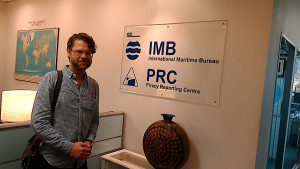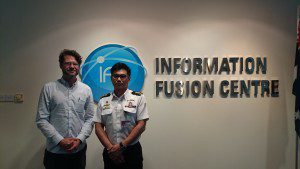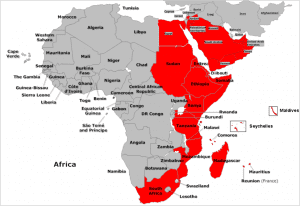Over the next week I am attending the plenary meeting of the Contact Group on Piracy off the Coast of Somalia (CGPCS). The group is the main global governance mechanism to steer and coordinate the global fight against Somali piracy (FAQ). The group is the major case study of my ESRC project “Counter-Piracy Governance” and I am working for the group in a lessons learned project. Since I attended my first plenary meeting in 2013, the group has been quite radically transformed in the face of the decline of piracy in the region. Not only is there growing uncertainty about the purpose of the group, but it is unclear what efforts of capacity building and ongoing patrols will be needed to sustain the current containment. The program of the plenary reflects this, in that only two of the working groups are meeting. Both the working group on capacity building and operations will focus on discussing the results of technical subgroups. They will meet a day prior to the plenary on Wednesday. On Thursday there will be an offside event focused on the African Maritime Security Architecture.
Category Archives: In the field
Regional Information Sharing III: A visit to the IMB’s Piracy Reporting Center
 Yesterday, I visited the Piracy Reporting Center (PRC) of the International Maritime Bureau (IMB) at its office in Kuala Lumpur. The IMB works on piracy since its installment in the 1980s, and the PRC is the oldest piracy information sharing center installed as a 24 hours operational center in 1991. From the visit to PRC it became clear how much emphasis this center puts on problemsolving and organizing rapid pragmatic responses by being the first point of contact of the shipping community and getting law enforcement agencies to act. The fact that it is set up as a non-governmental organization has clear benefits, since the PRC can put different pressure on states, e.g. through the media, then governmental centers can do. As a body, which aims at assisting the shipping industry and seafarers primarily, the IMB, is the Red Cross of the Oceans if it comes to piracy.
Yesterday, I visited the Piracy Reporting Center (PRC) of the International Maritime Bureau (IMB) at its office in Kuala Lumpur. The IMB works on piracy since its installment in the 1980s, and the PRC is the oldest piracy information sharing center installed as a 24 hours operational center in 1991. From the visit to PRC it became clear how much emphasis this center puts on problemsolving and organizing rapid pragmatic responses by being the first point of contact of the shipping community and getting law enforcement agencies to act. The fact that it is set up as a non-governmental organization has clear benefits, since the PRC can put different pressure on states, e.g. through the media, then governmental centers can do. As a body, which aims at assisting the shipping industry and seafarers primarily, the IMB, is the Red Cross of the Oceans if it comes to piracy.
The visit completed my tour through the regions information sharing centers. I am currently completing a draft paper on the basis of the results which I will present at the Center of International Law of NUS on the 22nd of April. The paper argues to understand the three centers as a functional system in which each performs a different role. I also ask what the lessons from this system for other regions, in particular the Western Indian Ocean are.
Regional information sharing II: A visit to the ReCAAP ISC
 Following my recent visit to the IFC, this week I also had the pleasure to visit the second of the “big three” Information Sharing and Reporting Centres of South East Asia: the Information Sharing Centre of the Regional Cooperation Agreement on Combating Piracy and Armed Robbery (ReCAAP ISC). The ISC was launched in November 2006, and is hence the second oldest centre devoted to piracy (after the Piracy Reporting Centre of the International Maritime Board, IMB PRC). The basis of the centre is a formal multi-lateral (government-to-government) agreement finalized in November 2004 which came into force in 2006. In comparison to IFC, it is hence a more formalized and institutionalized form of cooperation which includes a governing council which steers the work of the ISC. ReCAAP has become a major role model for agreements in other areas, including the 2010 Djibouti Code of Conduct (DCoC) in the Western Indian Ocean and the more recent Yaounde Code of Conduct (YCoC) operating in the Gulf of Guinea. ReCAAP has 19 “Contracting Parties” which includes the East Asian literals, but also a range of European states (Denmark, Netherlands, Norway, UK) and Australia, Japan and the US. Continue reading
Following my recent visit to the IFC, this week I also had the pleasure to visit the second of the “big three” Information Sharing and Reporting Centres of South East Asia: the Information Sharing Centre of the Regional Cooperation Agreement on Combating Piracy and Armed Robbery (ReCAAP ISC). The ISC was launched in November 2006, and is hence the second oldest centre devoted to piracy (after the Piracy Reporting Centre of the International Maritime Board, IMB PRC). The basis of the centre is a formal multi-lateral (government-to-government) agreement finalized in November 2004 which came into force in 2006. In comparison to IFC, it is hence a more formalized and institutionalized form of cooperation which includes a governing council which steers the work of the ISC. ReCAAP has become a major role model for agreements in other areas, including the 2010 Djibouti Code of Conduct (DCoC) in the Western Indian Ocean and the more recent Yaounde Code of Conduct (YCoC) operating in the Gulf of Guinea. ReCAAP has 19 “Contracting Parties” which includes the East Asian literals, but also a range of European states (Denmark, Netherlands, Norway, UK) and Australia, Japan and the US. Continue reading
A role model for information sharing? Visiting the Singapore IFC
 Fusing information from different data sources is one of the major challenges of the maritime security agenda. It is important notably for transnational coordination across the civil-military and public-private divide and to ensure timely responses to emerging threats and incidents. A shared picture of the maritime domain is also a trigger for regional security cooperation. Shared interpretations of the situation and shared securitizations are a known to facilitate maritime security communities. It is one of the lessons from Somali piracy that information sharing works best if it is organized pragmatically. Mechanisms, that thrive without large scale multi-lateral treaties, but work on an informal or technical/operational level are the most effective. In the Western Indian Ocean, the Shared Awareness and Deconfliction (SHADE) mechanism by which naval operations are coordinated is the prime example of such a mechanism.
Fusing information from different data sources is one of the major challenges of the maritime security agenda. It is important notably for transnational coordination across the civil-military and public-private divide and to ensure timely responses to emerging threats and incidents. A shared picture of the maritime domain is also a trigger for regional security cooperation. Shared interpretations of the situation and shared securitizations are a known to facilitate maritime security communities. It is one of the lessons from Somali piracy that information sharing works best if it is organized pragmatically. Mechanisms, that thrive without large scale multi-lateral treaties, but work on an informal or technical/operational level are the most effective. In the Western Indian Ocean, the Shared Awareness and Deconfliction (SHADE) mechanism by which naval operations are coordinated is the prime example of such a mechanism.
Yesterday I had the opportunity to visit the Information Fusion Centre (IFC) of the Singapore navy. The IFC is an innovative centre established 6 years ago that develops a shared maritime security picture for South East Asia. This includes piracy hotspots such as the straits of Malacca and Singapore as well as the South China sea. Yet, the IFC does not only focus on piracy, but the broader spectrum of maritime security issues, including fishery crimes and maritime terrorism (but excluding inter-state issues). How does the IFC work? And what can be learned from it for how to handle maritime security coordination?
Will the Seychelles become the regional leader in the fight against piracy?
The Republic of Seychelles is a front state in the fight against piracy. Hardly any country has suffered from piracy as much, with the tourism and fishing industry paying a significant price for the ongoing risks of piracy activity in the regional waters. Western states increasingly hesitate to devote as much resources to the fight against piracy as they have done since 2008 when piracy escalated. There is much debate on whether the naval missions CTF 151, NATO’s Ocean Shield and EUNAVFOR, commonly known as the big three, will continue past 2016 given the decline in successful attacks. Through missions such as EUCAP Nestor, IMO’s Djibouti Code of Conduct Process and UNODC’s Maritime Crime Programme much has been invested in building up the capacity of regional states to put them in the position to patrol the regional waters. Keeping piracy down and fighting maritime crime, reaching from the smuggling of narcotics and people to addressing the pressing problem of wildlife crime are the challenges of the future.
The Seychelles have been a main recipient of capacity building and they have taken the lead in prosecuting pirates. During my visit to Victoria and Mahe Island last week I was able to get an impression of the progress of capacity-building. Much has been achieved. The Montagne Posée Prison, where pirates are detained and await their trials or serve their sentence until they are transferred, has been refurbished and is operated following international standards. The construction of new court room facilities in Victoria is almost complete. Training for the Coast Guard, Airforce, prosecutors, police and prison services is ongoing and three mentors work with these agencies. The Coastguard has received three new vessels this year and radar stations are being built to ensure better maritime domain awareness. A new civil maritime police force will complement the work of the Coastguard, notably in ensuring safety in the coastal zones. While much has been achieved the need for more capacity building continues. While the equipment that the Seychelles will require to govern their maritime domain in collaboration with regional partners is there, capacitybuilding will have to increasingly concern the software. Recruiting, training and educating staff and establishing adequate management structures by which the new infrastructure can be maintained under the conditions of high resource scarcity remain major challenges. Efforts will also concern to improve the sharing and fusing of information and the coordination between the different ministries and agencies that are responsible for the maritime domain. It is clear that more progress will be needed to govern the vast maritime domain of the Seychelles.
Recently the Seychelles has stepped up to co-chair one of the working groups of the international Contact Group on Piracy off the Coast of Somalia. This is an important step. The region will require a leading nation that steers the debate on the future of the maritime security architecture in the region. Now is the time to take further responsibilities and start the debate on how the Seychelles can contribute together with partners such as India and the United Arab Emirates to the future maritime security architecture in the region. This will also imply to ask when the Seychelles are ready to become a role model and make the move from the receiver of training to becoming a training and donor nation. Will the Seychelles soon be one of the big three in the future of counter-piracy and maritime security?
Turtle or Dolphin? AIMS in November. News from Addis
When the African Union concluded the negotiations on its African Integrated Maritime Strategy earlier this year it received much appraisal. The continent had finally woken up and recognized the importance of the sea, its economic potential but also what needs to be done to secure it. The strategy foregrounds the economic development potential of the sea, and as Jan Stockbruegger argued on piracy-studies.org reflects “a particular ‘African’ understanding and experience”. The conclusion of AIMS sparked some excitement across the continent and spurred debate on how the many challenges of governing the sea efficiently can be managed. Critical voices were skeptical whether the document is actually a “strategy” or should be rather seen as wishlist, pointing to ubiquitous parts of AIMS, such as the construction of giant aquariums or kick-starting a shipbuilding industry. The more critical issue is however what the relation between the Regional Economic Communities (RECs) and the African Union will be in implementing the strategy. How to implement the strategy, distribute roles and responsibilities, and how to fund the actions that the strategy foresees. At present AIMS is a sensitive sprout that will require much care and indeed some fertilizers to grow into a strong tree. By summer the implementation task forces that was created within the AU legal office did not had an independent budget and an action plan and budget proposal hadn’t left the draft stage. A main hindrance for the work of the task force was that by the finalization of AIMS the bi-annual budget negotiations had already been concluded leaving little wiggle room for an AIMS budget.
What’s the state of AIMS now? To find out I met with the Taskforce in Addis Ababa. The taskforce within the African Commission remains a small team of four staff members. Its current main activity concerns the preparation of the work of a new strategic task forces. The new task force will consist of about 19 seconded representatives from regional organizations and member states working in a network structure. The task forces will lead the implementation strategy, prepare the budget as well make proposals concerning the organizational design what will eventually become a department of maritime affairs within the African Union Commission.
AIMS has had a slow start and not much of what the strategy has outlined has so far been translated into concrete projects. The first timelines of the AIMS action plan end in 2018. AIMS needs to catch up speed. 2015 will be the start of the African maritime decade. This might become a further incentive to make more efforts to translate AIMS into action.
One of the most important initial steps will be to follow the European Union account and to start developing overviews and mappings of who is doing what on the continent and what is the state of maritime governance, laws and institutions on the continent. A next step might be then to start developing a shared communication infrastructure, to ensure that the right people communicate to each other. Perhaps one solution in this regards could be a Mercury type infrastructure for the African continent. Given such a platform could be implemented relatively easily it might be a plausible step not only to ensure better continent-wide communication but to develop shared maritime situation awareness. The AU and the REC’s moreover will have to start claiming ownership and authority over maritime policy and start to orchestrate the diverse capacity building projects already going on, including those in place as part of the counter-piracy infrastructure in West and East Africa. Claiming such ownership will imply to scale up the involvement and indeed leadership in international fora such as the Contact Group on Piracy off the Coast of Somalia.
The AU can draw on much support in implementing the strategy. The EU has announced close collaboration between the EU Maritime Strategy and AIMS. That also NATO is willing to step up its support, was one of the outcomes of an academic seminar taking place in Addis Ababa on 20th of November. The seminar titled “AU-NATO Collaboration: Towards a strategic partnership” was organized by the research division of the NATO Defense College and the Royal Norwegian Embassy in Ethiopia. If the conference’s main focus were issues such as how to fix the estrangement between both organization stemming from the Lybia intervention, the support for the African Standby Forces, or training and capacity building more broadly, maritime security and AIMS was a theme that was continuously referred to as one of the areas in which more collaboration appears promising. And indeed representatives from the AU highlighted the vitality of the maritime domain, and threats such as illegal fishing, migration and piracy.
For AIMS to swim with the cleverness, agility and smartness of a dolphin, more will have to be invested in terms of political capital, but also financial resources. The African states do not stand alone in attempting to tackle such challenges. It might be time to think about the roles different actors, and organizations, including academia and think tanks can play in supporting AIMS. Perhaps it is time to create a Group of Friends of the African Integrated Maritime Strategy.
Inside the capacity building mess: Visiting MARSIC and EUCAP Nestor
 Capacity building is one of the most important responses to curb piracy and other forms of maritime crime. The international community has long recognized this. If the majority of capacity building projects were initially concerned about the prosecution and detention of piracy suspects the emphasis has gradually shifted towards maritime security sector reforms, and developing regional integration mechanisms in information sharing and developing collective responses. Two important missions in this regards are the EU’s MARSIC project and the civilian CSDP mission EUCAP Nestor both headquartered in Djibouti City. Both form part of a complex thicket of projects and programs, many of which are on a bilateral level. Today I had the opportunity to learn more about both of these missions.
Capacity building is one of the most important responses to curb piracy and other forms of maritime crime. The international community has long recognized this. If the majority of capacity building projects were initially concerned about the prosecution and detention of piracy suspects the emphasis has gradually shifted towards maritime security sector reforms, and developing regional integration mechanisms in information sharing and developing collective responses. Two important missions in this regards are the EU’s MARSIC project and the civilian CSDP mission EUCAP Nestor both headquartered in Djibouti City. Both form part of a complex thicket of projects and programs, many of which are on a bilateral level. Today I had the opportunity to learn more about both of these missions.
Together with the Project Implementation Unit of the International Maritime Organization MARSIC is the backbone of the training programme of the Djibouti Code of Conduct (DCoC), a regional agreement concerned about developing a joint response to piracy. MARSIC, one of the least known EU capacity-building projects, assists the DCoC countries in developing and delivering their training program. If the building of the Djibouti Regional Training Centre (DRTC), which is supposed to become the core regional facility where training is conducted, is, after four years, still under construction, MARSIC has brought the training programme to life. MARSIC’s training consultant explained to me today, how course contents are selected through a prioritization procedure with national training coordinators, course content is developed with partners such as the World Maritime University based in Sweden, and how they are delivered. Courses usually take place in local hotels, are run 5 days, and are comprised of morning lectures as well as a practical day. MARSIC also runs regular piracy exercises together with the national focal points using the VENUS platform, a training version of MERCURY. Together the aim of the project is to develop a community of skilled counter-piracy practitioners. To do so MARSIC also has plans to establish a research facility, a library and online resources, although implantation suffers from technical difficulties (such as internet access) and a lack of funding, for instance for library resources. How the DRTC will be run, once construction is completed also remains an open question. This concerns not only intellectual support but also long term funding. With the closure of the Project Implementation Unit of the IMO and MARSIC ending in summer 2015 the question remains how the centre will be supported in the long run. If IMO continues its everyday support through its Maritime Security division, in the long run the centre will require a permanent donor. Yet, there are also some good news. Training coordination will be soon taken over by a local staff member and there are many indications that the training and exercises show effect. Maritime crime is a transnational problem, it is hence pivotal that DCoC as the main project emphasizing a regional responses receives ongoing support.
My second meeting was with EUCAP Nestor. Nestor is a mission that runs since 2012 and was supposed to prep up the level of capacity-building provided. As I wrote in an earlier blog it was long a mission in “search of a mission” as it faced staffing problems and it was unclear what gaps Nestor was supposed to fill. Capacity building is, as I wrote in my last lessons learned paper, one of the areas in which coordination has more or less failed so far. When Nestor was introduced this enforced the multiplicity of activities, and, one is tempted to say, the chaos and over-activity in the area. During my meeting with a representative from Nestor I was re-assured that the mission is increasingly finding its place. Nestor conducts a rich training program and following a strategic review in 2013, Nestor has a new mandate and is increasingly focused on Somalia. Offices in Mogadishu and Hargeisa will soon be opened and seven weeks training courses are run for the different coast guards of the regional entities and the Federal government. The emphasis of Nestor has shifted to a 60:20:20 formula. 60% of the activities devoted to Somalia, 20% to Djibouti, the Seychelles, and Tanzania, and the last 20% for support to the region, e.g. in the frame of DCoC. Discussing the coast guarding course revealed the many practical challenges capacity building faces. My interlocutor described the course as a “basic one”. And basic indeed it is, as part of the course content are skills such as swimming, marching or handling cameras for evidence collection.
Capacity building is one of the areas that will require ongoing investments, not only to stop piracy, but also to fight other maritime crimes. Getting the region to act together, and making nations realize what economic potential the blue economy holds and why they should care about the maritime domain will be important objectives. The coordination of capacity building is a failure. And one does not have to be a pessimist to state that it will continue to be a mess. But perhaps coordination is not the biggest issue. As Michel Soula from NATO highlighted at this week’s maritime security workshop in Geneva, duplication under the conditions of the scarcity of resources can be a virtue. Then the true issue is that the diverse capacity building missions start to learn from each other, including practical lessons, such as how to implement courses, or share facilities. Rather than coordination, the second issue might be seen in contradiction, that is, in trying to avoid that the content of training and the support in institution building and law drafting do not contradict each other.
Counter-Piracy Week of CGPCS in Dubai
The 17th plenary of the Contact Group on Piracy off the Coast of Somalia (CGPCS) and its working group meetings will take place in Dubai from the 26th to the 28th of October. At the plenary I will give a short talk that provides an overview over the key results of the Lessons Learned Project on the group. The future of the CGPCS and the current counter-piracy architecture will be a key issue on the agenda, as will be questions such as how to improve capacity building coordination, how to re-shape the High Risk Area and to ensure high alert of the shipping community. The meeting will be followed by the high level conference “Securing State Recovery: Sustaining Momentum at Sea, Confronting Instability on Land” during which I will be moderating the plenary panel on “Lessons Learned from Maritime Piracy in the Horn of
Africa and a Framework for Future Cooperation”.
Meeting with Deputy Secretary General of the EEAS
 On the 19.9. I met with Marcieji Popowski, Deputy Secretary General of the EU’s European External Action Service to discuss the initial outcomes of the Lessons Learned Project of the Contact Group on Piracy off the Coast of Somalia (CGPCS) and prepare for the 2014 counter-piracy week in Dubai.
On the 19.9. I met with Marcieji Popowski, Deputy Secretary General of the EU’s European External Action Service to discuss the initial outcomes of the Lessons Learned Project of the Contact Group on Piracy off the Coast of Somalia (CGPCS) and prepare for the 2014 counter-piracy week in Dubai.
In the Field: What’s the Future of DCoC?
 Yesterday I met with representatives from the International Maritime Organization (IMO) to discuss the future of counter-piracy and lessons learned from it. A core issue was the IMO-run Djibouti Code of Conduct Process (DCoC). DCoC is one of the major responses to Somali piracy that conducts capacity building in the region in order to ensure the building of institutions that can prevent a long term solution to piracy. The management of DCoC will be re-organized in the coming months, the specific Project Implementation Unit shut down and the work transferred to normal IMO desks. This is on the one hand a clear signal of how mature the DCoC project has become, with one of the final steps, the opening of the training center in Djibouti to be completed this year. On the other hand this development questions whether in future sufficient attention and energy will be invested by the IMO to go further steps in the implementation of DCoC. The visit also allowed for a longer lessons learned interview with Phil Holihead of IMO which is forthcoming with the Lessons Learned Project of the CGPCS.
Yesterday I met with representatives from the International Maritime Organization (IMO) to discuss the future of counter-piracy and lessons learned from it. A core issue was the IMO-run Djibouti Code of Conduct Process (DCoC). DCoC is one of the major responses to Somali piracy that conducts capacity building in the region in order to ensure the building of institutions that can prevent a long term solution to piracy. The management of DCoC will be re-organized in the coming months, the specific Project Implementation Unit shut down and the work transferred to normal IMO desks. This is on the one hand a clear signal of how mature the DCoC project has become, with one of the final steps, the opening of the training center in Djibouti to be completed this year. On the other hand this development questions whether in future sufficient attention and energy will be invested by the IMO to go further steps in the implementation of DCoC. The visit also allowed for a longer lessons learned interview with Phil Holihead of IMO which is forthcoming with the Lessons Learned Project of the CGPCS.